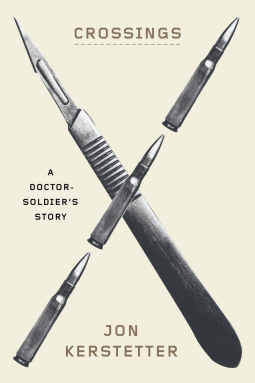I’m interrupting what would ordinarily be a chronological accounting of the books I’ve read to talk about Crossings, which I just finished a week ago. I’m skipping ahead partially because it was a NetGalley book and I like to be immediate with those reviews and partially because I had a lot of thoughts about it.

Author: Jon Kerstetter
My GoodReads rating: 5 stars
Average GoodReads rating: 4.24 stars
Language scaling: B2+
Plot summary: Kerstetter’s journey as a doctor, a combat medic, and a stroke survivor
Content warning: Kerstetter was a combat medic in Iraq and, before that, an NGO-affiliated volunteer doctor in war zones in Rwanda and Kosovo. He doesn’t shy away from the brutality inherent in either of those positions. Expect frank descriptions of gore, injuries and deaths.
Recommended audience: Readers looking for #ownvoices works (Kerstetter originally hails from the Oneida nation); readers interested in memoirs; readers interested in the military; readers interested in neurology
In-depth thoughts: I originally requested Crossings from NetGalley because I was in the middle of working on a memoirs project and thought that it would be beneficial to read something else in the genre.
I was also, to be entirely honest, inherently put off by the book based on its content, as a more-or-less pacifist. Ironically enough, that also tilted me towards requesting Crossings, because I think it’s important to engage in dialogue with people who disagree with you. It forces you to critically examine your own beliefs and principles, it builds empathy, and it broadens your understanding of the world. While I can’t say that I now understand the appeal of going into combat or the thrill of engaging the enemy, I at least understand how it was appealing for Kerstetter. Even though the war memoirs were my least favorite part, they were still engaging.
What I found the most powerful, however, was everything that came after Kerstetter’s tours in Iraq: his stroke and the possibility of recovery. Kerstetter gives a clear account of the cognitive impairments resulting from his stroke and also his frustration with them. Here he was, someone who had always loved reading and literature, who had gone through university and then medical school, now struggling to make it through children’s books. War might not be anything I’ll ever be able to relate to, but the effect that old age or an accident might have on my mental capacities is something that gnaws at me.
As America (and other nations) continue to cope with the metaphorical fallout from the wars in Iraq and Afghanistan, accounts like Kerstetter’s will become invaluable as far as the domestic effects are concerned. How could we have better taken care of troops while they were in combat? How can we erase the stigma of PTSD? Can we better acclimate soldiers to their own crossings: from civilian to solider and then back again?
